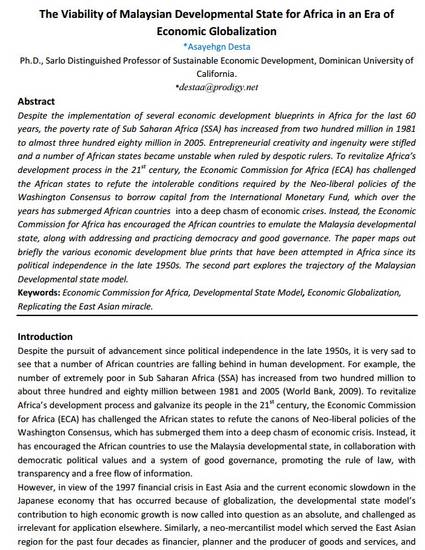
Article
A Conceptual Framework for Assessing the Transferability of the the Japanese Kaizen Management Techniques to Manufacturing Plants in Ethiopia
Asian Journal of Business and Management Sciences
(2011)
Abstract
Based on its competitive success in the 1990s, in its aid package to support growth for those countries late to industrialization, Japan has used its kaizen management system, (a continual process of improvement which is related to quality and productivity) to intensify the capacity development goals of Africa as monitored by the Japan International Cooperation Agency (JITC). Fully convinced that the Japanese kaizen management model would be an effective strategy for latecomers like Ethiopia to industrialization and realizing that the contribution of the manufacturing sector to GDP is only about 5 %, employees of thirty pilot companies from Ethiopia were sent to Japan. Then, the Kaizen Unit was sent to Egypt, Tunisia, and Japan with employees of the pilot companies to have work-site observation and learn from the experience of the Japanese kaizen practitioner. The purpose of this paper is to review the literature and develop a conceptual framework for assessing the transferability of the Japanese “kaizen” management techniques to manufacturing plants in Ethiopia.
Keywords
- kaizen practices,
- continuous improvement,
- organizational culture,
- transferability of techniques to improve quality and productivity
Publication Date
2011
Publisher Statement
Originally published as Desta, A. (2011). A conceptual framework for assessing the transferability of the Japanese Kaizen Management techniques to manufacturing plants in Ethiopia. Asian Journal of Business & Management Science 1 (2011), 6, 09-19.
Citation Information
Asayehgn Desta. "A Conceptual Framework for Assessing the Transferability of the the Japanese Kaizen Management Techniques to Manufacturing Plants in Ethiopia" Asian Journal of Business and Management Sciences Vol. 1 Iss. 6 (2011) p. 9 - 19 ISSN: 2047-2528 Available at: http://works.bepress.com/asayehgn_desta/17/
